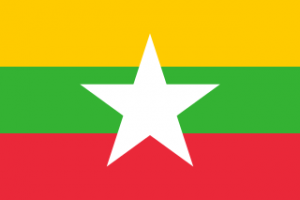Language/Burmese/Grammar/Future-Tense
Hi Burmese learners! 😊
In this lesson, we will focus on the future tense in Burmese grammar. We will learn how to use the future tense to talk about events or actions that will happen in the future.
Finish this lesson and explore these related pages: Expressing Manner and Frequency & Negation.
Forming the Future Tense[edit | edit source]
To form the future tense in Burmese, we use the particle "မဟုတ်ဘူး" (ma-hote-bhu). This particle is added to the end of the verb. For example:
| Burmese | Pronunciation | English |
|---|---|---|
| သင်ကြားမည် | [θɪ́ɴdʑá wá mɛ̀] | I will go |
| သင်ကြားချိန်းမည် | [θɪ́ɴdʑá tɕʰéɪɴ mɛ̀] | You will go |
| သင်ကြားချိန်းခဲ့ရင် | [θɪ́ɴdʑá tɕʰéɪɴ kɛ̀ jɪ̀ɴ] | You will go if you want to |
In addition to "မဟုတ်ဘူး" (ma-hote-bhu), we can also use other particles to express the future tense with different nuances:
- "လာတယ်" (la-tai): to indicate an action in progress in the future. For example: "ချစ်သွားလာတယ်" (chit-swè-là-tai) - I will go and come back.
- "ပြဿနာ" (pré-tanà): to indicate a goal that will be achieved in the future. For example: "မြန်မှာဖြဿနာပြောနေကြသောလူ" (myan-mar-pré-tanà-pya-ne-kè-thè-so-lu) - The man who will have achieved his goal in Myanmar.
Using the Future Tense[edit | edit source]
The future tense is used to talk about events or actions that will happen in the future. It can also be used to express a probability or a plan for the future. For example:
- သင့်ရဲ့လက်များကို မင်းပြည့်စောင့်မယ်။ (θɪ́ɴde-la-kma-myù-pya-n-sàung-hmè) - I will store your things for you.
- မြန်မာနိုင်ငံတော် ရဲကောင်းချာမြောက်ရဘူး။ (myan-ma-nin-ngàn-dau-ya-kaung-cha-mar-kauk-bhù) - Myanmar will be a beautiful country.
- ငါတို့သည် လူတိုင်းများသည် ယခင်ပြင်ဆိုင်သော တိုင်းပြောသည့် ကိုးကွယ်ထားသောအခါနှင့် ဆိုင်းငံ့ကာလအတွင်း လှောင်လင်နိုင်ချမ်းသာပေးသည်။ (ngà-to-thè-thu-ni tè-kaung-ma-ya khin-prè-saung-thè-sè-kauk-yaing-taung-pya-thè-ko-kwa) - We will share the benefits of our country's economic growth and development with the people and distribute the wealth equitably.
⚠ Note[edit | edit source]
The particle "မဟုတ်ဘူး" (ma-hote-bhu) is a formal and literary way of expressing the future tense in Burmese. In everyday conversation, it is more common to use other particles like "လာတယ်" (la-tai) or "ပြဿနာ" (pré-tanà).
Dialogue[edit | edit source]
Person 1: ခန့်မှန်မှု ဘယ်လိုရှိရင်လဲ။ (kan-hmè-na-mè-bhè-là-ka) - What will happen to the economy?
Person 2: ယခုလောက်မှ လှာချင်ရင် နေရာမှာ သုံးနေတဲ့ လူတိုင်းအချိန် သည် စိတ်တိုင်းတွင် ရှိနေသော အင်တာနက်များကို လက်ခံရရှိနေလို့။ (yì-lauk-hmàn-mla-chin-yan-ta-maung-kàn-aing-ya-mi) - People who are employed will have job security in their workplace when going to work.
Person 1: ဘယ်လို ကောင်းသော လူတိုင်းသည် စိတ်ကြိုက်ရခဲ့လဲ။ (bhè-là-kaung-thau-kha-ya-lu) - Will people be happy with the pay?
Sources[edit | edit source]
➡ If you have any questions, please ask them in the comments section below.
➡ Feel free to edit this wiki page if you think it can be improved. 😎
Other Lessons[edit | edit source]

